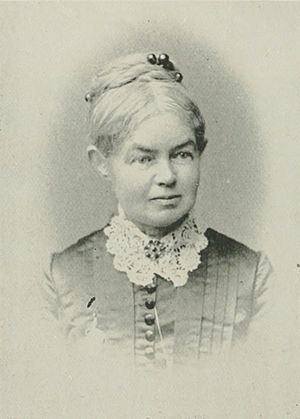Emily Howland facts for kids
Quick facts for kids
Emily Howland
|
|
|---|---|

Portrait of Emily Howland from American Women
|
|
| Born | November 20, 1827 |
| Died | June 29, 1929 (aged 101) |
Emily Howland (born November 20, 1827 – died June 29, 1929) was a very kind person who helped others a lot (a philanthropist) and a teacher. She is most famous for her work in educating African-Americans. She also strongly supported women's rights and the movement to reduce alcohol use (the temperance movement). Emily Howland even paid for many Black students' education herself. She also gave money to schools like the Tuskegee Institute.
Contents
Early Life and Education
Emily Howland was born in Sherwood, New York, on November 20, 1827. Her parents, Slocum and Hannah Tallcot Howland, were important members of the Quaker community. Her brother, William Howland, was a politician in New York. Emily went to small private schools in her town. She also attended the Margaret Robinson School, a Quaker school in Philadelphia, Pennsylvania.
Helping Others and Teaching
Emily Howland was an active abolitionist, meaning she worked to end slavery. From 1857 to 1859, she taught at the Normal School for Colored Girls in Washington, D.C.. This school is now known as the University of the District of Columbia.
During the American Civil War, Emily helped at a camp called Camp Todd in Arlington County, Virginia. This camp was for freed slaves, also known as "contraband" at the time.
- She taught freed slaves how to read and write.
- She cared for sick people during a smallpox outbreak.
- From 1864 to 1866, she was the director of the camp.
Starting a School in Virginia
In 1867, Emily Howland started a community for freed people in Heathsville, Virginia. It was called Arcadia. Her father bought 400 acres of land for this project. On this land, Emily opened the Howland Chapel School. This school was for the children of freed slaves.
Emily always cared deeply about education for African-Americans.
- She gave money and supplies to many schools.
- She visited schools and wrote letters to their leaders.
Running a School in New York
After her father passed away in 1881, Emily returned to Sherwood, New York. She inherited $50,000, which would be about $2 million today! She used this money to help others.
Emily ran the Sherwood Select School until 1926. Then, the state of New York made it a public school. It was renamed the Emily Howland Elementary School in her honor.
Fighting for Women's Rights
Emily Howland was also very active in other important movements:
- Women's suffrage: This was the fight for women to have the right to vote.
- Peace movement: Working to prevent wars.
- Temperance movement: Trying to reduce or stop the use of alcohol.
She was a member of the Woman's Christian Temperance Union. In 1858, she started organizing talks and meetings about women's rights. She worked with famous leaders like Susan B. Anthony and Elizabeth Cady Stanton.
Speaking Out for Women
Emily spoke at important events:
- In 1878, she spoke at the 30th anniversary of the Seneca Falls Convention. This was a very important meeting for women's rights.
- In 1894, she spoke to the New York State Legislature.
When the women's suffrage movement split into two groups, Emily did not pick a side. She attended meetings of both groups. In 1903, she even had tea with Queen Victoria during a trip to London for an international meeting about women's right to vote. In 1904, she spoke in front of the United States Congress. She also attended suffrage parades in New York in 1912 and 1913.
Emily Howland is also known for convincing Ezra Cornell to make Cornell University a coeducational institution. This means it would accept both male and female students, which was not common at the time.
Later Life and Achievements
In 1926, Emily Howland received an honorary degree called a Doctor of Letters (Litt.D.) from the University of the State of New York. She was the first woman to receive this honor from that university.
She also wrote a book about the early history of Quakers in Cayuga County, New York. The book was called Historical Sketch of Friends in Cayuga County.
In 1890, Emily Howland became one of the first women directors of a national bank in the United States. She served on the board of the First National Bank of Aurora in Aurora, New York, until she passed away at the age of 101.
Legacy
Emily Howland's important papers are kept at several universities. These include Cornell University, Haverford College, and Swarthmore College. A photo album with pictures of her family, friends, and important abolitionists is owned by the National Museum of African American History and Culture and the Library of Congress.
In 2021, Emily Howland was honored by being added to the National Women's Hall of Fame.
See also
 In Spanish: Emily Howland para niños
In Spanish: Emily Howland para niños
 | James Van Der Zee |
 | Alma Thomas |
 | Ellis Wilson |
 | Margaret Taylor-Burroughs |

